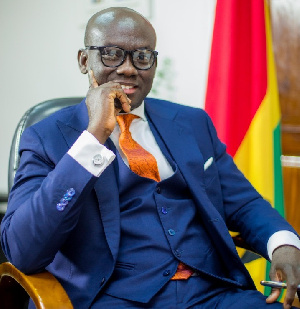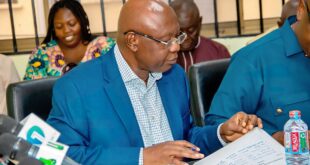The Permanent Court of Arbitration has, in a final award dated January 30, 2023, dismissed an investor-state arbitration instituted by Beijing Everyway Traffic & Lighting Tech. Co. Ltd. (the “Claimant”) against the Government of Ghana (“Respondent”) after upholding a preliminary objection by the Attorney-General acting as counsel for the Government of Ghana.
Beijing Everyway Traffic & Lighting Tech. Co. Ltd invoked the jurisdiction of the tribunal under a Treaty between the Government of the People’s Republic of China and the Government of the Republic of Ghana Concerning the Encouragement and Reciprocal Protection of Investments concluded on 12th October 1989, seeking the award of damages amounting to “not lower than US$55 million”.
Arbitral Tribunal and Counsel on Record
The Members of the Arbitral Tribunal who delivered the final award are Professor Stavros Brekoulakis (presiding arbitrator), Mr. V.K. Rajah SC and Professor Richard Oppong.
The final award of the Permanent Court of Arbitration shows that at the proceedings, the Government of Ghana was represented by the Attorney-General and Minister for Justice, Godfred Yeboah Dame. Other Counsel listed as part of Ghana’s team include Ms. Diana Asonaba-Dapaah (Deputy Attorney-General); Mrs. Helen Akpene Awo Ziwu (Solicitor-General); Dr. Sylvia Adusu; Mrs. Grace Mbrokoh Ewoal and Ms. Yvonne Bannerman, all state attorneys.
Background
The dispute leading to the arbitral proceedings relates to an intelligent traffic management system project in Accra, Ghana, namely the AITMS Project. On 16th December 2011, Ghana signed a Master Facility Agreement and other related Finance Documents with the China Development Bank for a term loan facility to develop twelve (12) infrastructure projects in Ghana, including the AITMS Project. The Claimant was awarded the AITMS Project on or about April 2012. Subsequently, on 17 September 2012, the Claimant and the Ministry of Roads and Highways of Ghana signed the EPIC Contract.
Under the EPIC Contract, the Claimant, Beijing Eeveryway, agreed to supply equipment and provide technical services to the Respondent in respect of the planning, design, construction, supervision, operation and training for the AITMS Project in Accra. The Parties agreed to a Contract Price of US$ 100 million and an advance payment of 30%.
On 22nd December 2018, the Parliament of Ghana approved by resolution the EPIC Contract. The Commencement Date of the EPIC Contract was fixed as 26th August 2019 and the works were scheduled to be completed in 24 calendar months.
According to the Claimant, between 12th and 15th November 2019, a six (6) member team of the Ministry of Roads and Highways of Ghana conducted a technical visit to its factory and warehouses in China to inspect the production and inventory of the equipment for the AITMS Project.
During the visit, the Ghanaian delegation observed, inspected and counted the manufactured equipment prior to shipment to Ghana. In January 2020, the Department of Urban Roads of Ghana, under the instruction of the Ministry of Roads and Highways of Ghana, confirmed that Beijing Everyway could ship to Ghana the equipment inspected by the technical team in November 2019. On 15th January 2020, the Department of Urban Roads of Ghana issued an onsite work permit to Everyway for the AITMS Project, covering the installation of new traffic signals, communication network and general civil works at signalized and non-signalized intersections in Accra.
On 3rd February 2020, Everyway reported to the Department of Urban Roads of Ghana that it had loaded nineteen containers of equipment for shipment for the AITMS Project and asked it to prepare for import customs clearance in Ghana. On 21st February 2020, about six months after the commencement of the AITMS Project, the first installations at two intersections in Accra were switched on, indicating the official launch of the AITMS Project in Ghana.
During the course of the AITMS Project, the Claimant issued two Interim Payment Certificates amounting in total to US$ 21,995,728 for works that had been performed up to the date of issuance of each Interim Payment Certificate. According to the Claimant, by the time of the Notice of Arbitration (i.e. 10 February 2021), Everyway had completed works with a contractual value of at least US$ 21,995,728.
According to the Claimant, on 24th March 2020, the Minister of Finance of Ghana requested the Vice President of Ghana to convene a meeting to discuss the AITMS Project. Two meetings among the Vice President of Ghana, Minister of Finance of Ghana, Minister of Roads and Highways of Ghana, Minister of National Security of Ghana, and Deputy Attorney General of Ghana were subsequently called in early April 2020, where it was agreed that two technical teams from the Ministry of National Security and Ministry of Roads and Highways of Ghana would be formed to supervise certain of the AITMS Project. It was also further agreed that Ministry of Roads and Highways of Ghana would remain responsible for certain other aspects of the AITMS Project.
On 24th April 2020, the Vice President of Ghana issued a decision letter to direct the Minister of Finance of Ghana to convey to the China Development Bank that the project would proceed as approved, with Everyway being the contractor and the Ministry of Roads and Highways of Ghana being the implementing agency on the part of Ghana. However, on 19 November 2020, the Parliament of Ghana suddenly informed the Claimant of Parliament’s decision to rescind the approval of the EPIC Contract.
Accordingly, on 30th December 2021, the Claimant served Ghana with a notice terminating the EPIC Contract on the ground that the Respondent had “either directly or indirectly, unlawfully expropriated” the Claimant’s investment because the Parliament of Ghana, inter alia, “rescinded approval for the valid and effective EPIC Contract under which Everyway had completed substantial amount of work with (a) no national security or public interest justification, (b) no due domestic legal procedure, (c) in a discriminatory manner, and (d) with no compensation whatsoever for the damages caused.”
The Claimant sought a declaration that the Respondent has breached Article 4(1) of the China-Ghana Investment Treaty. Furthermore, the Claimant argued that Ghana had breached its duty under the Treaty to observe obligations it has entered into with regard to investments made by Chinese investors (i.e. a breach of the Umbrella Clause).
Ghana, on the other hand, argued that it has not breached the Treaty because the decision of the Parliament of Ghana to rescind the EPIC Contract with the Claimant was taken in the interests of Ghana’s national security. Ghana further submitted that the Tribunal has no jurisdiction over the Claimant’s claims.
Ghana’s submissions on the Tribunal’s lack of Jurisdiction
Arguing the objection to the jurisdiction of the tribunal at a hearing conducted virtually on 22nd March, 2022, the Attorney-General, Godfred Yeboah Dame submitted that the provision of Article 10(1) of the China- Ghana Agreement limits the Tribunal’s jurisdiction to only the determination of the quantum or amount of expropriation, and not the determination of the primary issue whether there has been expropriation at all. The Tribunal thus had no jurisdiction to determine whether Ghana expropriated the Claimant’s investment in the AITMS Project pursuant to Article 4 of the Treaty or breached its contractual obligations with the Claimant under the EPIC Contract pursuant to the Umbrella Clause obligations applicable in this arbitration through Article 3(2) of the Treaty.
The Attorney-General further argued that relying on Articles 4(1), 4(3) and 10(5) of the Treaty, it is Ghanaian courts that have jurisdiction over the question of the lawfulness of an alleged expropriation, not an arbitral tribunal. An investor bringing a claim for expropriation under the Treaty, must therefore do so “under domestic legal procedure” and under Ghanaian law.
Mr. Dame submitted to the tribunal that the object and purpose of the Treaty were not only to protect foreign investments but also to encourage foreign investment and foster economic cooperation between the two Contracting States. Accordingly, this required a balanced approach to the interpretation of the Treaty’s substantive provisions, given that a focus only on the protection of foreign investments may dissuade host States from admitting foreign investments and, thus, undermine the overall aim of intensifying the Contracting States’ mutual economic relations.
Mr. Dame referred to about twenty (20) Bilateral Investment Treaties (BIT) concluded by China prior to the China-Ghana Agreement, and pointed out that none of them provided that an investor can submit any dispute, regardless of its nature, to arbitration. Rather, these BITs provided that investors may only refer the amount of compensation to arbitration, while the question of existence and unlawfulness of expropriation is reserved for amicable settlement or domestic courts of the respective contracting states. The same was the case for other BITs entered into by Ghana with other states. Accordingly, it was evident that neither China nor Ghana recognised the right of an investor to submit the question of the existence and lawfulness of expropriation to international arbitration prior to 1989.
Claimant’s case on the Tribunal’s Jurisdiction
The Claimant opposed Ghana’s submissions and argued that the subject matter of the dispute fell under the jurisdiction of the Tribunal. The claimant argued that first, Article 10(1) of the China-Ghana Treaty provides that an arbitral tribunal has jurisdiction on “[a]ny dispute … concerning the amount of compensation for expropriation”; and second, the broad dispute resolution clauses contained in Ghana’s treaties with other countries apply in this dispute through the MFN clause contained in Article 3(2) of the Treaty.
According to the Claimant, Article 10(1) of the Treaty, when interpreted “in good faith in accordance with the ordinary meaning to be given to the terms of the treaty in their context and in the light of its object and purpose”, should be understood to include not only the question of the amount of compensation for expropriation (i.e. the question of quantum) but also the question of the unlawfulness of expropriation of the Claimant’s investment (i.e. the question of entitlement). The Claimant further argued that Articles 4(1)(a), 4(3) and 10(5) of the Treaty, read independently or jointly, do not require the Claimant to submit a claim for expropriation to the competent courts of Ghana. According to the Claimant, when the investment of a Chinese investor is expropriated by Ghana, Article 4(3) of the Treaty and Article 20(2) of the Constitution of Ghana simply give the investor an option (and not an obligation) to refer the matter to Ghanaian courts. The Claimant argued that the object and purpose of the Treaty support the Claimant’s case that an arbitral tribunal, under Article 10(1) of the Treaty, has jurisdiction to determine the question of both quantum and entitlement of expropriation.
The Claimant submitted that, according to the “most favoured nation” principle, the dispute resolution provisions of Ghana’s investment treaties with the United Kingdom (Article 10) and Denmark (Article 10) apply in the dispute between the Claimant and the Respondent and thus the Tribunal had jurisdiction over the Claimant’s claims in this arbitration.
Tribunal’s Decision
The Tribunal, upon an application of relevant principles of international investment law, came to the final decision that it does not have jurisdiction to decide the Claimant’s claims for expropriation under Article 10(1) of the Treaty.
The Tribunal stated that the ordinary meaning of Article 10(1) of the Treaty cannot be read as meaning to include the question of entitlement of expropriation. In this respect, the Tribunal noted the important qualification of the term “the amount of” prior to the terms “compensation for expropriation” as placing clear limitations on the scope of questions which can be referred to arbitration. The ordinary meaning of the phrase “concerning the amount of compensation for expropriation”, according to the Tribunal, does not include the question of entitlement or determination of whether expropriation has taken place in the first place.
Further, the Tribunal c considered that there is nothing in the China-Ghana Treaty to suggest that an investor would be precluded from referring the question of quantum to arbitration under Article 10(1) of the Treaty, once it had referred the question of lawfulness of expropriation to determination by a nation’s domestic court.
The Tribunal highlighted that it did not consider that a Contracting State may unilaterally preclude an investor from referring the matter of quantum of compensation for expropriation to international arbitration, after it has first referred the matter of entitlement to compensation or determination of expropriation, to national litigation.
The Tribunal held that the examination of the provision of Article 10(1) within the context of the China-Ghana Agreement suggested that the phrase “concerning the amount of compensation for expropriation” cannot be interpreted as vesting an arbitral tribunal with jurisdiction to decide the question of whether the expropriation is lawful or unlawful.
Thus, except for the limited scope of Article 10(1) concerning the quantum of compensation for expropriation, there is no provision which would give investors a distinct right to commence arbitration in respect of a breach of any substantive protection under the Treaty.
In conclusion, the Tribunal found that it did not have jurisdiction to decide the Claimant’s claims for expropriation under Article 10(1) of the Treaty. Also, the Tribunal considered that it did not have jurisdiction to decide the Claimant’s claims in the arbitration under Article 3 of the Treaty. The Tribunal also found that the most favoured nation provision in Article 3(2) of the Treaty cannot be used to extend the Tribunal’s jurisdiction to the Claimant’s claims in this arbitration.
Costs
In relation to Costs, the Tribunal noted that both Parties have sought their costs in respect of the arbitration to date. The Tribunal invited the Parties to directly confer and seek to agree on the issue of costs or, failing such agreement, to inform the Tribunal of their agreed format and timetable of their costs submissions within thirty (30) days of receipt of the Award. In the event that the Parties fail to agree on the issue of costs, the Tribunal will address the matter and issue an award on costs covering the arbitration proceedings to date.
Another arbitration case by Beijing Everyway
Concurrent with the proceedings at the Permanent Court of Arbitration, Beijing Everyway has instituted another arbitration seeking damages of at least US$55 million for the same subject matter at the London Court of International Arbitration. The Attorney-General has again raised objections in these proceedings, both to the procedure and the substance of the case at that forum, as well.
 Home Of Ghana News Ghana News, Entertainment And More
Home Of Ghana News Ghana News, Entertainment And More





